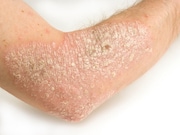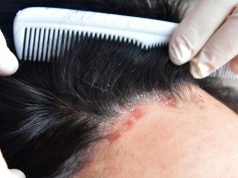Meat, fish intake patterns among psoriasis patients in Japan opposite of those in Western countries
FRIDAY, Sept. 27, 2019 (HealthDay News) — Psoriasis is associated with high body mass index (BMI) and low intake of meat, according to a Japanese study published in the September issue of the Journal of Dermatology.
Hiroko Yamashita, from Nippon Medical School in Tokyo, and colleagues evaluated dietary habits in adult Japanese patients with psoriasis using a validated, self-administered dietary history questionnaire. Results were compared to those of age- and sex-matched healthy controls.
The researchers found that Japanese psoriasis patients had higher BMIs, higher intake of fish/shellfish, pulses, sugar/sweeteners, vitamin B12, and vitamin D, and lower intake of meat, compared with healthy controls. Psoriasis was associated with high BMI and low intake of meat. In patients with high Psoriasis Area and Severity Index scores, intake of confection was higher than that seen in those with low scores. In psoriasis patients with arthritis, the intake of β-carotene, vitamin A, and green/yellow vegetables was higher than that seen in patients without arthritis.
“Most of the previous studies in Western countries showed higher intake of fat and lower intake of fish in psoriatic patients compared with the reference groups,” the authors write. “However, our results in Japanese psoriatic patients are rather different from those in Western countries: higher intake of fish/shellfish and pulses, and lower intake of meat compared with controls, though the Japanese patients showed higher BMI compared with controls, similar to Western patients.”
Abstract/Full Text (subscription or payment may be required)
Copyright © 2019 HealthDay. All rights reserved.








